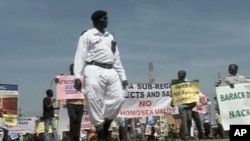A human rights activist has praised Washington’s expressions of concern that have helped slow down Uganda’s anti-homosexuality bill in parliament which she said, if enacted, would broaden the criminalization of homosexuality by putting to death those with previous convictions.
U.S. President Barack Obama and Secretary of State Hillary Clinton spoke out recently at the National Prayer Breakfast in Washington against Uganda’s proposed anti-homosexual measure.
Secretary Clinton also spoke with President Yoweri Museveni by telephone expressing her strong concerns about the measure.
Valentine Kalende, an Uganda-based activist said homosexuals and activists, as well as lawyers who defend them, are often violently abused.
Kalende is currently in Washington, D.C. as part of the State Department’s International Visitor Leadership program.
“My mission is to meet faith groups and members of the [U.S.] federal government and LBGT (Lesbian, Gay, Bisexual and Transgender) groups and other groups working on rights to create more awareness about the anti-homosexuality bill in Uganda,” she said.
Homosexuality is illegal in Uganda with offenders likely to be sentenced to up to 14 years in jail.
Recent polls show Ugandans are against homosexuality with some saying the practice is alien to the country’s cultural practices, as well as an affront to traditional values and belief systems.
Uganda’s proposed anti-homosexuality law stipulates that gays and lesbians convicted of having sex would be sentenced, at minimum, to life in prison. People who test positive for HIV may be executed. Homosexuals who have sex with a minor, or engage in homosexual sex more than once, may also receive the death penalty. Anyone who knows of homosexual activity taking place, but does not report it, would risk up to three years in prison.
But, local and international human rights group have rejected the proposed law saying the move will result in a witch hunt against homosexuals in Uganda.
Supporters of the bill have warned parliamentarians not to block it. They threatened to embark on campaigns against the lawmakers if they fail to end what they described as an abomination that will undermine the country’s moral fabric, as well as its social structure.
Rights activist Kalende said her experience in America will make her better equipped to face the possible challenges in Uganda.
“I have been to Salt Lake City (Utah), which is known for its conservative views from the Mormon Church. Now, my lesson there has been of how to engage conservative religious people [and] religious leaders in a conversation on human rights issues…and that there is room for conversations and dialogue,” Kalende said.
But, barring any government intervention, indications are that Ugandan lawmakers will pass the bill before the end of the year.
Kalende said a majority of Ugandan lawmakers don’t believe that LGBT issues are human rights issues.
She also said that politicians often blame the United States and other European countries of bringing the homosexuality practice to Africa.
“As activists, it is becoming more and more difficult to stay safe and that is our biggest challenge right now because Ugandans are angry now that they think that the government has kind of slowed down on this issue. They want the bill to be passed immediately. Now, in case this bill does not pass, and in case the government backs off, Ugandans are prepared to start shooting gays, or to start raping lesbians, or just doing whatever they can,” Kalende said.











